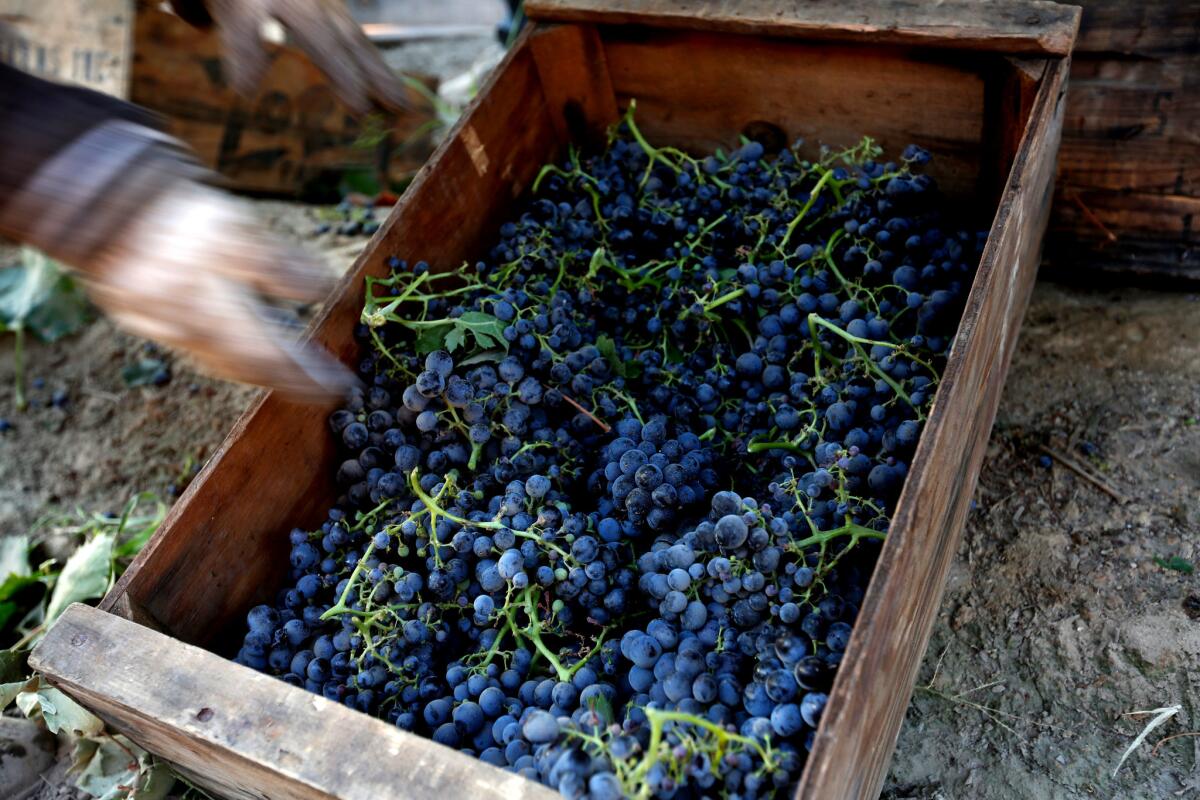Anger, passion drive debate over more overtime pay for California farmworkers

Central Valley farmworker Lourdes Cardenas is among those hoping that a new California overtime law will provide a better life for those working in the fields.
- Share via
Before the roosters in her backyard start to crow, Lourdes Cardenas rouses from bed, dresses for work in a worn T-shirt and jeans and packs a lunch under the dim fluorescent lights of her sparse kitchen.
For more than 11 years, Cardenas, 53, has picked grapes, peaches and strawberries in fields outside of Fresno. The hard labor makes her muscles ache. The sun casts spells of exhaustion, and the nearly $25,000 she brings in a year — cutting vines 10 hours a day, six days a week — barely makes ends meet.
“We live paycheck to paycheck,” she says. “We can’t save. We can’t provide a better future for ourselves or our families.”

Gov. Jerry Brown made history on Monday after he signed legislation that will increase overtime pay for hundreds of thousands of California farmworkers who, like Cardenas, have been struggling to earn a living wage. Assembly Bill 1066, authored by Assemblywoman Lorena Gonzalez (D-San Diego), will gradually reduce the 10-hour-day threshold for farmworker overtime starting in 2019. By 2022, workers should be able to earn overtime pay after eight hours of work in a day or 40 in a week.
The decision closed out an intense political battle that dominated the state Capitol. But perhaps no place better captures the frustrations, tensions and emotions that remain over the issue than the San Joaquin Valley Cardenas calls home.
The fight for farmworkers’ rights has roots in this 10,000-square-mile stretch of flatlands, orchards and vineyards, where friction between labor and agricultural interests existed long before the days of Cesar Chavez.
The peak of the labor movement has passed. The agriculture industry has vastly evolved. But in heated discussions at farms and ranches, in homes and labor union offices, old ideas persist, pitting economics against human rights, and the views of employers against those of employees.

Farmers see the new law as yet another slight by a state Legislature that misunderstands the Central Valley, its industry and its needs. They argue their employees did not support the legislation, which was sponsored by the United Farm Workers of America, a union that they say represents a small percentage of the farm labor force.
Farmworkers like Cardenas say they are the few union members left willing to fight for the greater good of a disadvantaged community too frightened or hesitant to demand more. This year, they said, their voices have been represented on the Assembly and Senate floors.
“It is too soon to say the impact,” said Guadalupe Sandoval, managing director for the California Farm Labor Contractor Assn. “I think it’s going to be a very interesting wait-and-see.”

Farmers say there is no place like the San Joaquin Valley. It is one of the most productive agricultural areas in the world, boasting a rare mediterranean climate, with a long, dry growing season and temperatures that aren’t too hot in the summer or too cold in the winter.
Fifty percent of the global supply of raisins is produced within a 60-mile radius of Fresno, and its soils can grow a diverse array of crops hard to raise anywhere else.
But if the Central Valley has been able to maintain its high level of productivity, farmers and ranchers said, it has been without the help of the governor or the state Legislature, who over the past decade have tightened regulations on labor, water control and air quality, even as they struggle through a drought.
The expansion of farmworker overtime is just the latest hit to their bottom line, several growers said, coming months after Brown signed into law a gradual increase of the minimum wage.
“The dying of California agriculture is not occurring simply because of a singular rule,” said Ryan Jacobsen, executive director of the Fresno County Farm Bureau. “It’s kind of like a death by a thousand cuts.”

To comply with the overtime expansion, growers and ranchers said, they would have to adjust work schedules and cut employee hours to avoid the new costs. Some farmers said they had friends who were considering retiring or leaving the state.
But weighing the economic impact on the $54-billion agriculture industry is difficult. Data on the hours put in by farmworkers and on their numbers in California are significantly limited, given their mobility and legal status and the seasonal, short-term nature of their work.
The state Employment Development Department estimated a total of 419,500 agricultural jobs existed in 2015, accounting for 2.5 percent of all industry employment in the state — but it noted that farmworkers could be undercounted. Some university researchers estimate there could be as many as 850,000 farmworkers in California.
A study commissioned by the Western Growers Assn. found the new regulations would affect some 362,600 workers.
In the worst-case scenarios of the association’s analysis, farmworker wages could fall by about $1.5 billion, jobs could decrease by 35,000 to 78,000 and agricultural production could see an almost $8-billion drop in a one-year period, assuming full implementation of the new law. In its best-case scenario, which assumes all farm operations are profitable and competitive enough to absorb the overtime costs, wage earnings could increase by about $2,200 per worker.
As he drove through his almond orchards to survey his crops last week, Matthew Efird, a fifth-generation farmer in the Riverdale area, said he would have to absorb the additional overtime costs during harvest time. But he said he could not afford to pay his 12 to 15 full-time farm employees overtime throughout the year.
“Put yourself in my shoes,” he said. “You have a budget that you have to operate in. You got uncertain market conditions. You got all these expenses. What is your job as a CEO of a company? Maximize profits. That is your job.”
California leads on best farming practices and has some of the most progressive farm labor practices in the country, Efird said. But to Efird and other farmers, that means increasing regulations in recent years have made it hard to operate on a day-to-day basis.

Farmers must now comply with rules from more than a dozen state agencies, growers said, without economic incentives to keep their businesses competitive in a global market. The Air Resources Board controls their burning of tree limbs and vines. The State Water Resources Control Board monitors the use of nitrogen for their plants. The Department of Pesticide Regulation manages the chemicals they spray.
“There is so much regulation, the average grower has probably unintentionally broken the law six times by noon,” Efird said.
He manages nearly 1,600 acres and a commercial business renting out trucks, vehicles and harvesters. To stay profitable, he moved from farming corn and alfalfa to permanent crops such as walnuts, almonds and raisins, which last through many seasons and can be harvested by machines rather than human labor.
Faced with minimum-wage and overtime pay increases, other growers could follow a similar tactic. But not all have the same options: No mechanization process exists that is delicate enough to pick fresh fruit.
Near Efird, dairy farmer Donny Rollin said he can’t buy more equipment or limit the schedules of his 24 employees, who must care for the 2,150 cows on his 630-acre ranch when they must be milked on the hour each day and give birth to calves.
Rollin said he was angry that legislators from big cities are coming up with solutions to problems that he says don’t exist.
“If you look all over the state, you will see there are not small dairies anymore and you will realize there are not small dairies for a reason,” he said.

But in the Madera office of the UFW last week, a handful of workers sat around long plastic tables, writing letters to the governor in support of AB 1066. Photographs of Chavez and red flags with the union logo hung on the walls.
Drastic changes have occurred in the fields since Chavez led strikes, marches and protests to demand better opportunities and greater political power for farmworkers — the majority of whom are Latino immigrants.
Crecencio Camacho, 45, remembers that as a farm laborer in his teens, farmers did not provide employees with potable water or restrooms. In more recent years, legislative changes have implemented protections for workers against heat illnesses and sought to require safety belts on farm labor vans. Today, Camacho earns $10 an hour working a grape harvester through the night and said he struggles to support his wife and three children.
Each reform has been hard-fought in Sacramento, the union members said, and each time they have been met with the same arguments and complaints from farmers.
“We have to continue the fight,” said Veronica Mota, 41, who like many workers in the fields, is in the U.S. illegally. “Not to make my life better but to make our families’ lives better.”
And to keep fighting after laws have passed, Camacho added.
“The rules take years to get written down on paper and then more years for [employers] to abide by them,” he said.
Juanita Hernandez, 42, said she is worried she won’t have the savings to buy her 16-year-old son a car. Her husband works as a union leader, and she makes about $400 to $500 a week working about 40 to 50 hours picking and packing grapes in the fields.
“If I am able to work more than nine hours with overtime, it is going to be a tremendous help,” she said.
Outside her humble wooden home in the darkness of a September morning, Cardenas moved fast, cooling the radiator of her old Ford Explorer with a jug of water and loading her things into the back seat and trunk. Small packets of gauze and alcohol for cuts and scrapes. A wicker basket full of chips and cookies to sell to her fellow workers during breaks. White cotton gloves she bought for a dollar and will toss at the end of the day, when she is covered in dust.
She said necessity dispelled any fears of making her voice heard. She believed farmers were bluffing when they said they would cut employee hours.
“They need our hands,” she said. “We are valuable to this industry, but they do not want to pay us our worth.”
Follow @jazmineulloa on Twitter
ALSO:
In historic move, Gov. Jerry Brown expands overtime pay for California farmworkers
California lawmakers expect another showdown on overtime pay for farmworkers
Get the L.A. Times Politics newsletter
Deeply reported insights into legislation, politics and policy from Sacramento, Washington and beyond. In your inbox twice per week.
You may occasionally receive promotional content from the Los Angeles Times.








